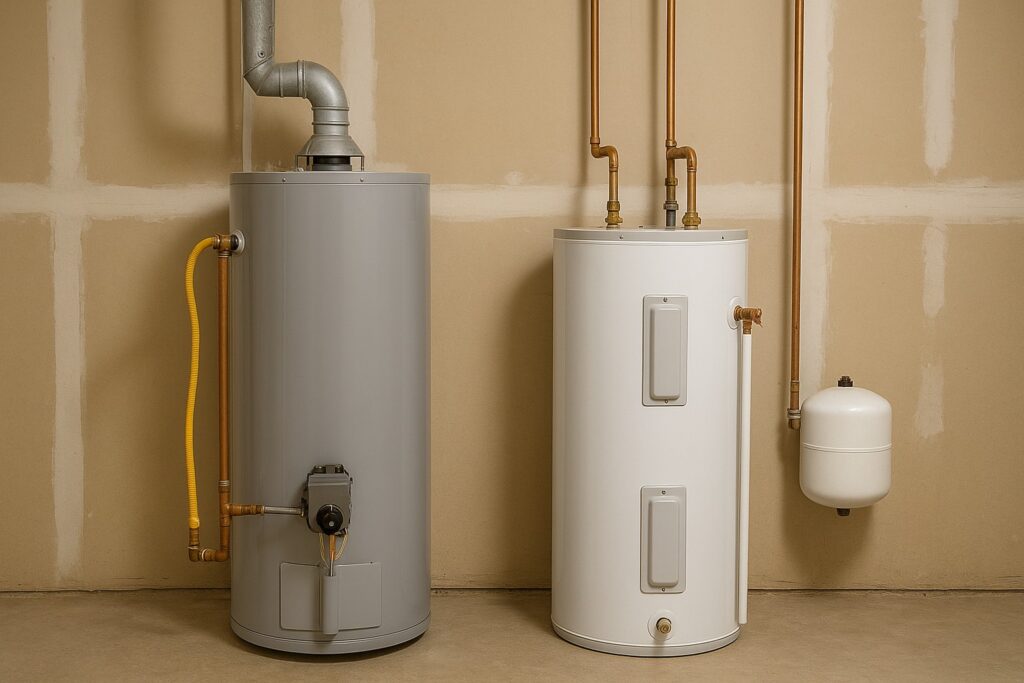A gas vs an electric water heater differs primarily in how it generates heat. Gas water heaters rely on natural gas or propane burners to heat water quickly, while electric water heaters use heating elements powered by electricity. This distinction influences not only performance but also installation, maintenance, and operating costs. Immediately after this comparison, it becomes clear that each type has advantages depending on household needs.
How do electric water heaters work?
Electric water heaters use resistive heating elements inside the tank to warm water directly. They are compact, quiet, and easier to install because they do not require venting. One of the most notable electric water heater benefits is their lower upfront cost and suitability for homes without access to natural gas lines. They are also considered safer, as they eliminate risks associated with gas leaks or combustion. However, electricity rates can make them more expensive to operate in regions with high utility costs.
What are the advantages of gas water heaters?
Gas water heaters are known for their fast recovery times and ability to deliver hot water consistently, even during peak demand. Among the most significant gas water heater advantages is their lower operating cost in areas where natural gas is affordable. They can heat larger volumes of water quickly, making them ideal for families with high hot water usage. On the downside, gas heaters require proper venting and regular maintenance to ensure safety and efficiency.
Which water heater is more energy efficient?
When comparing water heater types, efficiency depends on both the fuel source and household usage. Electric water heaters often achieve higher energy efficiency ratings because nearly all the electricity consumed is converted into heat. Gas water heaters, while less efficient in terms of energy conversion, may still be more cost‑effective due to lower fuel prices. Homeowners should also consider environmental impact, as electric models can be powered by renewable energy sources, while gas heaters rely on fossil fuels.
What factors should homeowners consider before choosing?
The decision between gas vs electric water heater systems should account for installation costs, availability of fuel sources, household size, and long‑term operating expenses. Electric models are easier to install in apartments or smaller homes, while gas models may be better suited for larger households with higher demand. Maintenance requirements also differ, with gas heaters needing regular inspections of burners and vents, while electric heaters typically require less upkeep.
Conclusion
Ultimately, the choice between a gas vs electric water heater depends on household priorities. Families seeking lower upfront costs and safer operation may prefer electric models, while those needing faster recovery and lower fuel expenses may lean toward gas systems. By carefully weighing electric water heater benefits against gas water heater advantages, homeowners can make an informed decision that balances efficiency, safety, and cost. For professional installation and expert guidance, Water Heater Services in San Marcos, TX, are available to help. And when it comes to trusted comfort solutions, homeowners can rely on Woods Comfort Systems for lasting performance and peace of mind.
FAQs (Frequently Asked Questions)
1. Which lasts longer, a gas or electric water heater?
Electric water heaters generally have a longer lifespan, often lasting 10–15 years compared to 8–12 years for gas models.
2. Is a gas water heater cheaper to run than an electric one?
Yes, in areas with low natural gas prices, gas heaters are usually cheaper to operate than electric units.
3. Do electric water heaters heat water slower than gas models?
Electric heaters typically take longer to recover hot water after heavy use, while gas heaters reheat faster.
4. Are gas water heaters more dangerous than electric ones?
Gas heaters carry risks of leaks and combustion, requiring proper ventilation, while electric heaters are considered safer.
5. Can homeowners switch from gas to electric water heaters easily?
Yes, but switching requires electrical upgrades or gas line removal, which can increase installation costs.

